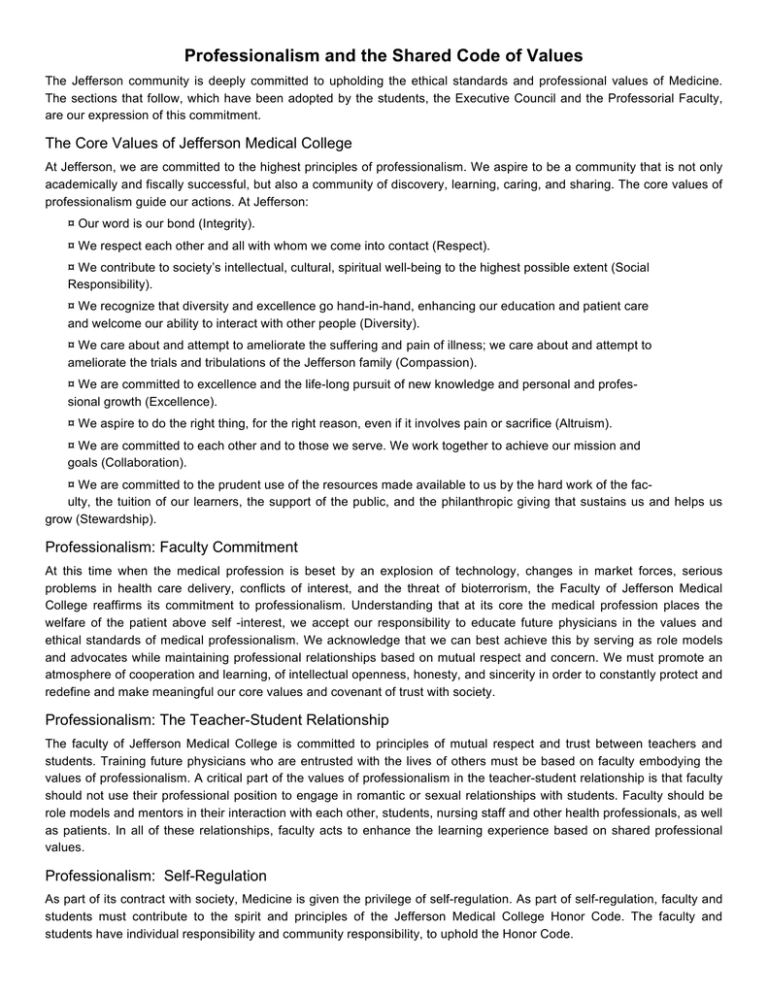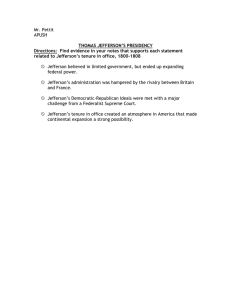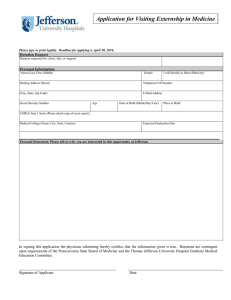Professionalism and the Shared Code of Values
advertisement

Professionalism and the Shared Code of Values The Jefferson community is deeply committed to upholding the ethical standards and professional values of Medicine. The sections that follow, which have been adopted by the students, the Executive Council and the Professorial Faculty, are our expression of this commitment. The Core Values of Jefferson Medical College At Jefferson, we are committed to the highest principles of professionalism. We aspire to be a community that is not only academically and fiscally successful, but also a community of discovery, learning, caring, and sharing. The core values of professionalism guide our actions. At Jefferson: ¤ Our word is our bond (Integrity). ¤ We respect each other and all with whom we come into contact (Respect). ¤ We contribute to society’s intellectual, cultural, spiritual well-being to the highest possible extent (Social Responsibility). ¤ We recognize that diversity and excellence go hand-in-hand, enhancing our education and patient care and welcome our ability to interact with other people (Diversity). ¤ We care about and attempt to ameliorate the suffering and pain of illness; we care about and attempt to ameliorate the trials and tribulations of the Jefferson family (Compassion). ¤ We are committed to excellence and the life-long pursuit of new knowledge and personal and professional growth (Excellence). ¤ We aspire to do the right thing, for the right reason, even if it involves pain or sacrifice (Altruism). ¤ We are committed to each other and to those we serve. We work together to achieve our mission and goals (Collaboration). ¤ We are committed to the prudent use of the resources made available to us by the hard work of the faculty, the tuition of our learners, the support of the public, and the philanthropic giving that sustains us and helps us grow (Stewardship). Professionalism: Faculty Commitment At this time when the medical profession is beset by an explosion of technology, changes in market forces, serious problems in health care delivery, conflicts of interest, and the threat of bioterrorism, the Faculty of Jefferson Medical College reaffirms its commitment to professionalism. Understanding that at its core the medical profession places the welfare of the patient above self -interest, we accept our responsibility to educate future physicians in the values and ethical standards of medical professionalism. We acknowledge that we can best achieve this by serving as role models and advocates while maintaining professional relationships based on mutual respect and concern. We must promote an atmosphere of cooperation and learning, of intellectual openness, honesty, and sincerity in order to constantly protect and redefine and make meaningful our core values and covenant of trust with society. Professionalism: The Teacher-Student Relationship The faculty of Jefferson Medical College is committed to principles of mutual respect and trust between teachers and students. Training future physicians who are entrusted with the lives of others must be based on faculty embodying the values of professionalism. A critical part of the values of professionalism in the teacher-student relationship is that faculty should not use their professional position to engage in romantic or sexual relationships with students. Faculty should be role models and mentors in their interaction with each other, students, nursing staff and other health professionals, as well as patients. In all of these relationships, faculty acts to enhance the learning experience based on shared professional values. Professionalism: Self-Regulation As part of its contract with society, Medicine is given the privilege of self-regulation. As part of self-regulation, faculty and students must contribute to the spirit and principles of the Jefferson Medical College Honor Code. The faculty and students have individual responsibility and community responsibility, to uphold the Honor Code. The Jefferson Medical College Honor Code As Jefferson students and faculty we seek to establish a community based on honor, integrity and awareness of others. Our commitment to this community begins with our first day of professional or educational association with Jefferson Medical College when we sign a pledge to uphold the values and rules of the Honor Code that follows: As faculty, residents, fellows, and medical students, we pledge to embrace the academic and social integrity on which Jefferson was founded, pursuing honesty, equality and fairness in all aspects of our lives. This includes not seeking an unfair advantage over our peers, teachers, students, residents, fellows or any other member of the Thomas Jefferson University community. These goals are dependent on our personal concern for ourselves and one another, as well as our collective concern for the maintenance of the community standards that are reflected in the Code. The Honor Code assumes that all faculty, residents, fellows, and students conduct themselves in an ethical and professional manner. Altruism, accountability, commitment to excellence, duty to serve, honor, integrity and respect for others are essential characteristics of a physician. In addition, the code is dependent on the collective desire of all members of the academic community to prevent and deter violations, rather than on proceedings to impose penalties after violations have occurred. If violations do occur within this system, each member of the community is expected to support and uphold all aspects of the code. Community — A goal of each member of the college is to foster an environment of trust and cooperation with respect for the work and efforts of others. When we speak of community we imply the student body, the faculty, the staff, and the administration, each of which contributes to the combined concept of community. Academic Integrity — We seek to enhance our knowledge of medicine and achieve excellence in our time spent at Jefferson but not at the cost of honesty, integrity and trust, all integral aspects to the development of a physician. Social Integrity — Jefferson is dependent on equality among all its members, regardless of race, culture, religion, gender, or sexual orientation. Each individual should be treated with equal respect by his or her peers, faculty and staff. Responsibility — All members of the college must be willing and encouraged to discuss with their peers and all members of the community any action or issue that appears to be unacceptable and take the necessary actions in a timely manner to address the situation. The failure to deal with the breach in professional conduct not only jeopardizes the strength of the code but also puts the observer in direct violation of the code. Mediation — Resources exist for students, faculty and staff to meet with other people within the Jefferson community to work out any differences and disagreements with the help of a third party. If these efforts fail to reach a resolution, further resources through official college channels can be used to review any disagreement and determine the appropriate course of action. Each year at Orientations and the White Coat Ceremony, the students and faculty recite the following: Shared Professional Values of Jefferson Medical College In entering the profession of medicine, and in the process of crafting future physicians as students and educators, we recognize the implicit trust that patients and society have granted us. As such, we must commit to embodying the highest standards of civility, honesty, and integrity in all aspects of our personal and professional lives. This must include our interpersonal relationships, our academic pursuits, and our medical practices. We must treat everyone compassionately, and respect and protect his or her privacy, dignity, and individuality. As part of the trust that society has placed in us, we must advocate for outstanding patient care for all people. Accordingly, we must always recognize those attitudes and values of ours that may limit our ability to do so. As medical professionals, we must also recognize limitations in our knowledge and skills, and accordingly, we must accept our duty to provide and receive constructive feedback with the goal of improving our ability to care for our patients. This eagerness to improve is central to our commitment to excellence, and will be the foundation upon which we build our practice of lifelong learning.




